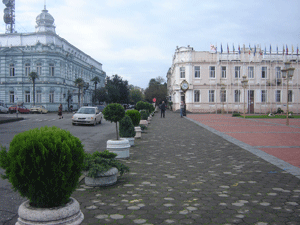 Maka Malakmadze, Batumi
Maka Malakmadze, Batumi
On November 3, the elections of the Supreme Council of Adjara Autonomous Republic are scheduled to be held. However, there is little fanfare, as the pre-election campaign is very passive in the region. There are not any election posters on the walls in the streets as yet. People are saying that they are tired of pre-election promises.
In the meantime, however, activists of the National Movement are continuing with visits to local families. They want to find out whether family members intend to go to the elections or not. Activists even are asking who the people plan to vote for and if they have sick person in the family who will need some kind assistance on the elections day, etc. “Everybody is getting very attentive about sick people before the elections. Why is it that they care about us any other time?” asked Dodo Lazishvili, a retired woman.
Candidates from the National Movement are friends and close people of Levan Varshalomidze, the head of the Adjara Autonomous Republic. Mikheil Mzhavanadze, a candidate from Shuakhevi district, is family doctor of Varshalomidze; Vazha Bolkvadzer, candidate from the Khelvachauri district, is former Minister of Economics and Finances in Adjara; Davit Chkonia, candidate from Kobuleti, is the district governor of Kobuleti. The National Movement continues their PR campaign by meetings with population and making various promises to voters. A woman from Kobuleti asked: “How can I believe that he will resolve the problems of roads, water and electricity meters because he did not do it when he was district governor?”
Employment, roads, installment of individual electricity meters, sale of the citrus crop and improvement in the agricultural sector are those issues that are widely discussed by the candidates with the voters. However, people are already tired with their false and empathy promises:
Asmat Baramidze, 27-year-old teacher: “I am not going to participate in the elections because I do not believe I can change anything by taking part. Much was done but not for the benefit of the people. To tell the truth, I do not know who are candidates are and what kind of programs they are offering to the voters. Election programs are always perfect sounding but candidates actually never do anything afterwards; that is the point.”
Mimoza Dumbadze, 56-year-old homemaker: “It makes no sense to take part in the elections or not. If they want to fix the elections results and they will do it anyway. The main point for politicians is the political game. If they have ever kept at least one part of their promises, we would not have been in such poor conditions.”
Mirian Saladze, 22: “I am going to vote because I want to know that I have made my choice. The Supreme Council of Adjara with its former 30 members was a serious “burden” for the region. We do not need this council because decisions are made by the central government. In addition, most members of the council are not residents of Adjara. These people have never done anything positive for the people.”
Dariko Mamuladze, a retired woman: “They have increased our pension but I cannot buy the same amount of products as I used with the previous pension. If it continues like that, I do not want the increased pension. Government should pay attention to the people. They misuse our trust. Everybody should remember that people are the stronger power and they should not only remember before the elections.”
Davit Kavtaradze, 35 year old, unemployed: “The biggest problem we face is unemployment. Why should I go Turkey to pick tea-leaves for some money there when we also grow tea in this part of Adjara? Will not be it better if we open our own factories? There is also the problem of unemployment and how to find a partial solution. I prefer to work in my native region and go home at the end of the work day.”
News
December 13, 2023
Ethnic minorities outside the peace dialogue
November 6, 2023
‘Peace’ agenda of political parties
Popular
Articles
February 13, 2024



